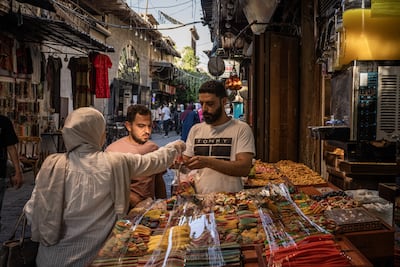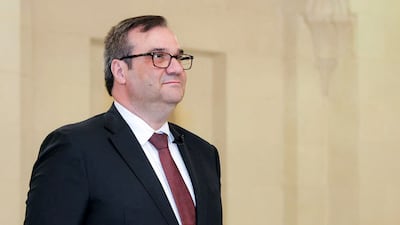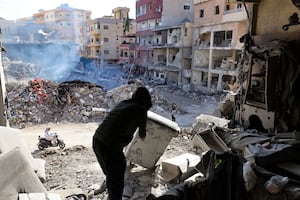Syria's banks, long-time pariahs in the global financial system, are expected to resume ties with international lenders within weeks, Syria’s central bank governor Abdulkader Husrieh told The National, a key development in the country's plan to reclaim a foothold in the global economy.
“We will not leave anyone behind. Generally, [local] banks will have their correspondent banks within the next few weeks,” he said.
Correspondent banking typically involves a local and a foreign bank acting as intermediaries for international transfers. It is a critical step for enabling transfers to and from Syria. These were almost entirely halted during the 14-year civil war, except for a few specific and tightly regulated cases.
Bankers in Syria told The National that discussions with their foreign counterparts were progressing well and some had already agreed to resume ties.
Mr Husrieh is seeking to woo big US lenders to forge ties with local partners and open representative offices in Syria, following US President Donald Trump’s decision in May to lift far-reaching sanctions on Syria's economy.
“It is impossible to overlook an economy that constitutes approximately 26.1 per cent of global GDP,” Mr Husrieh told The National, referring to the US.
Since the Bashar Al Assad regime was toppled in a lightning offensive led by Islamist rebel groups in December, Syria has sought to reintegrate into the global economy and rekindle its relationship with western powers.
In May, President Ahmad Al Shara, a former Al Qaeda-linked fighter turned statesman, met Mr Trump in Riyadh. The US President praised him as a “young, attractive guy … tough guy” with a “very strong past”.
Last week, Mr Husrieh held a virtual meeting with American and local banks, as well as US officials including Washington’s Syria envoy Thomas Barrack, in a bid to fast-track Syria’s return to the global financial system.
“We were clear in expressing our objective: to establish a fully-fledged relationship with the American financial sector,” Mr Husrieh said.
“The meeting went very well … it was the first such engagement after more than 50 years of practical boycott,” he added.
Process not 'one-time event'
Sanctions on Syria’s economy, including measures targeting the central bank, intensified after 2011 and Mr Al Assad’s violent crackdown on peaceful protests. These contributed to a steep economic crisis which has pushed one in nine people below the poverty line.
Reconnecting with the global financial system is a critical step for Syria to channel the billions in reconstruction funding that are set to flow into the war-ravaged country.
Experts and officials have welcomed the lifting of the most debilitating sanctions, while warning that complete economic recovery remains a long way off.
Specifically, observers stressed that the move does not mean foreign banks will automatically resume long-severed ties, citing concern over compliance and anti-money laundering regulations after years of isolation.
But Mr Husrieh said the Syrian financial sector is fully committed to adhering to international standards.
“Syrian banks presented their progress and current practices in Anti-Money Laundering and Combating the Financing of Terrorism (AML/CFT) compliance,” he said.
“The central bank is fully committed to modernising its systems and aligning with international standards as part of our broader vision for reintegration,” he added.
Mr Husrieh said Syria's reintegration into the global economy was a “process” rather than a one-off event.
“The first milestone is the lifting of sanctions, followed by the establishment of correspondent banking relationships and the licensing of new financial institutions. This is not a one-time event but rather a continuous and phased process aimed at restoring Syria's full participation in the global financial system.”
Mr Husrieh has previously outlined his road map to The National, focusing on monetary and financial stability, attracting foreign deposits, establishing an independent central bank, and developing dynamic local financial institutions.
Mr Husrieh said regional uncertainty has not changed his country's vision for reforms. “While strategies may adapt to evolving geopolitical realities, our vision and objectives remain unchanged,” he said.
What are the main cyber security threats?
Cyber crime - This includes fraud, impersonation, scams and deepfake technology, tactics that are increasingly targeting infrastructure and exploiting human vulnerabilities.
Cyber terrorism - Social media platforms are used to spread radical ideologies, misinformation and disinformation, often with the aim of disrupting critical infrastructure such as power grids.
Cyber warfare - Shaped by geopolitical tension, hostile actors seek to infiltrate and compromise national infrastructure, using one country’s systems as a springboard to launch attacks on others.
UAE currency: the story behind the money in your pockets
Asia Cup 2018 final
Who: India v Bangladesh
When: Friday, 3.30pm, Dubai International Stadium
Watch: Live on OSN Cricket HD
IF YOU GO
The flights: FlyDubai offers direct flights to Catania Airport from Dubai International Terminal 2 daily with return fares starting from Dh1,895.
The details: Access to the 2,900-metre elevation point at Mount Etna by cable car and 4x4 transport vehicle cost around €57.50 (Dh248) per adult. Entry into Teatro Greco costs €10 (Dh43). For more go to www.visitsicily.info
Where to stay: Hilton Giardini Naxos offers beachfront access and accessible to Taormina and Mount Etna. Rooms start from around €130 (Dh561) per night, including taxes.
Zayed Sustainability Prize
MOUNTAINHEAD REVIEW
Starring: Ramy Youssef, Steve Carell, Jason Schwartzman
Director: Jesse Armstrong
Rating: 3.5/5
Dhadak 2
Director: Shazia Iqbal
Starring: Siddhant Chaturvedi, Triptii Dimri
Rating: 1/5
Killing of Qassem Suleimani
UAE currency: the story behind the money in your pockets
RESULT
Copa del Rey, semi-final second leg
Real Madrid 0
Barcelona 3 (Suarez (50', 73' pen), Varane (69' OG)
FA CUP FINAL
Manchester City 6
(D Silva 26', Sterling 38', 81', 87', De Bruyne 61', Jesus 68')
Watford 0
Man of the match: Bernardo Silva (Manchester City)
BELGIUM%20SQUAD
%3Cp%3EGoalkeepers%3A%20Thibaut%20Courtois%2C%20Simon%20Mignolet%2C%20Koen%20Casteels%0D%3Cbr%3E%0D%3Cbr%3EDefenders%3A%20Jan%20Vertonghen%2C%20Toby%20Alderweireld%2C%20Leander%20Dendoncker%2C%20Zeno%20Debast%2C%20Arthur%20Theate%2C%20Wout%20Faes%0D%3Cbr%3E%0D%3Cbr%3EMidfielders%3A%20Hans%20Vanaken%2C%20Axel%20Witsel%2C%20Youri%20Tielemans%2C%20Amadou%20Onana%2C%20Kevin%20De%20Bruyne%2C%20Yannick%20Carrasco%2C%20Thorgan%20Hazard%2C%20Timothy%20Castagne%2C%20Thomas%20Meunier%0D%3Cbr%3E%0D%3Cbr%3EForwards%3A%20Romelu%20Lukaku%2C%20Michy%20Batshuayi%2C%20Lo%C3%AFs%20Openda%2C%20Charles%20De%20Ketelaere%2C%20Eden%20Hazard%2C%20Jeremy%20Doku%2C%20Dries%20Mertens%2C%20Leandro%20Trossard%3C%2Fp%3E%0A
Killing of Qassem Suleimani
More on Quran memorisation:
More from Neighbourhood Watch:
Killing of Qassem Suleimani
Story of 2017-18 so far and schedule to come
Roll of Honour
Who has won what so far in the West Asia rugby season?
Western Clubs Champions League
Winners: Abu Dhabi Harlequins
Runners up: Bahrain
Dubai Rugby Sevens
Winners: Dubai Exiles
Runners up: Jebel Ali Dragons
West Asia Premiership
Winners: Jebel Ali Dragons
Runners up: Abu Dhabi Harlequins
UAE Premiership Cup
Winners: Abu Dhabi Harlequins
Runners up: Dubai Exiles
Fixtures
Friday
West Asia Cup final
5pm, Bahrain (6pm UAE time), Bahrain v Dubai Exiles
West Asia Trophy final
3pm, The Sevens, Dubai Hurricanes v Dubai Sports City Eagles
Friday, April 13
UAE Premiership final
5pm, Al Ain, Dubai Exiles v Abu Dhabi Harlequins
Abu Dhabi Sustainability Week
The years Ramadan fell in May
more from Janine di Giovanni
Apple's%20Lockdown%20Mode%20at%20a%20glance
%3Cp%3EAt%20launch%2C%20Lockdown%20Mode%20will%20include%20the%20following%20protections%3A%3C%2Fp%3E%0A%3Cp%3E%3Cstrong%3EMessages%3A%3C%2Fstrong%3E%20Most%20attachment%20types%20other%20than%20images%20are%20blocked.%20Some%20features%2C%20like%20link%20previews%2C%20are%20disabled%3C%2Fp%3E%0A%3Cp%3E%3Cstrong%3EWeb%20browsing%3A%3C%2Fstrong%3E%20Certain%20complex%20web%20technologies%2C%20like%20just-in-time%20JavaScript%20compilation%2C%20are%20disabled%20unless%20the%20user%20excludes%20a%20trusted%20site%20from%20Lockdown%20Mode%3C%2Fp%3E%0A%3Cp%3E%3Cstrong%3EApple%20services%3A%20%3C%2Fstrong%3EIncoming%20invitations%20and%20service%20requests%2C%20including%20FaceTime%20calls%2C%20are%20blocked%20if%20the%20user%20has%20not%20previously%20sent%20the%20initiator%20a%20call%20or%20request%3C%2Fp%3E%0A%3Cp%3E%3Cstrong%3EConnectivity%3A%3C%2Fstrong%3E%20Wired%20connections%20with%20a%20computer%20or%20accessory%20are%20blocked%20when%20an%20iPhone%20is%20locked%3C%2Fp%3E%0A%3Cp%3E%3Cstrong%3EConfigurations%3A%3C%2Fstrong%3E%20Configuration%20profiles%20cannot%20be%20installed%2C%20and%20the%20device%20cannot%20enroll%20into%20mobile%20device%20management%20while%20Lockdown%20Mode%20is%20on%3C%2Fp%3E%0A
Killing of Qassem Suleimani
25-MAN SQUAD
Goalkeepers: Francis Uzoho, Ikechukwu Ezenwa, Daniel Akpeyi
Defenders: Olaoluwa Aina, Abdullahi Shehu, Chidozie Awaziem, William Ekong, Leon Balogun, Kenneth Omeruo, Jamilu Collins, Semi Ajayi
Midfielders: John Obi Mikel, Wilfred Ndidi, Oghenekaro Etebo, John Ogu
Forwards: Ahmed Musa, Victor Osimhen, Moses Simon, Henry Onyekuru, Odion Ighalo, Alexander Iwobi, Samuel Kalu, Paul Onuachu, Kelechi Iheanacho, Samuel Chukwueze
On Standby: Theophilus Afelokhai, Bryan Idowu, Ikouwem Utin, Mikel Agu, Junior Ajayi, Valentine Ozornwafor
ACC%20T20%20Women%E2%80%99s%20Championship
%3Cp%3E%3Cstrong%3EUAE%20fixtures%3C%2Fstrong%3E%3Cbr%3EFriday%2C%20June%2017%20v%20Oman%3Cbr%3ESaturday%2C%20June%2018%20v%20Singapore%3Cbr%3EMonday%2C%20June%2020%20v%20Malaysia%3Cbr%3EWednesday%2C%20June%2022%20v%20Qatar%3Cbr%3EFriday%2C%20June%2024%2C%20semi-final%3Cbr%3ESaturday%2C%20June%2025%2C%20final%3Cbr%3E%20%3Cbr%3E%3Cstrong%3EUAE%20squad%3A%3C%2Fstrong%3E%20Chaya%20Mughal%20(captain)%2C%20Esha%20Oza%2C%20Indhuja%20Nandakumar%2C%20Kavisha%20Kumari%2C%20Khushi%20Sharma%2C%20Lavanya%20Keny%2C%20Priyanjali%20Jain%2C%20Rithika%20Rajith%2C%20Samaira%20Dharnidharka%2C%20Sanchin%20Singh%2C%20Siya%20Gokhale%2C%20Suraksha%20Kotte%2C%20Theertha%20Satish%2C%20Vaishnave%20Mahesh%3C%2Fp%3E%0A
More on animal trafficking
Zayed Sustainability Prize
The studios taking part (so far)
- Punch
- Vogue Fitness
- Sweat
- Bodytree Studio
- The Hot House
- The Room
- Inspire Sports (Ladies Only)
- Cryo
Killing of Qassem Suleimani
First Person
Richard Flanagan
Chatto & Windus
Key facilities
- Olympic-size swimming pool with a split bulkhead for multi-use configurations, including water polo and 50m/25m training lanes
- Premier League-standard football pitch
- 400m Olympic running track
- NBA-spec basketball court with auditorium
- 600-seat auditorium
- Spaces for historical and cultural exploration
- An elevated football field that doubles as a helipad
- Specialist robotics and science laboratories
- AR and VR-enabled learning centres
- Disruption Lab and Research Centre for developing entrepreneurial skills
More from Neighbourhood Watch:
Zayed Sustainability Prize
Volunteers offer workers a lifeline
Community volunteers have swung into action delivering food packages and toiletries to the men.
When provisions are distributed, the men line up in long queues for packets of rice, flour, sugar, salt, pulses, milk, biscuits, shaving kits, soap and telecom cards.
Volunteers from St Mary’s Catholic Church said some workers came to the church to pray for their families and ask for assistance.
Boxes packed with essential food items were distributed to workers in the Dubai Investments Park and Ras Al Khaimah camps last week. Workers at the Sonapur camp asked for Dh1,600 towards their gas bill.
“Especially in this year of tolerance we consider ourselves privileged to be able to lend a helping hand to our needy brothers in the Actco camp," Father Lennie Connully, parish priest of St Mary’s.
Workers spoke of their helplessness, seeing children’s marriages cancelled because of lack of money going home. Others told of their misery of being unable to return home when a parent died.
“More than daily food, they are worried about not sending money home for their family,” said Kusum Dutta, a volunteer who works with the Indian consulate.
How has net migration to UK changed?
The figure was broadly flat immediately before the Covid-19 pandemic, standing at 216,000 in the year to June 2018 and 224,000 in the year to June 2019.
It then dropped to an estimated 111,000 in the year to June 2020 when restrictions introduced during the pandemic limited travel and movement.
The total rose to 254,000 in the year to June 2021, followed by steep jumps to 634,000 in the year to June 2022 and 906,000 in the year to June 2023.
The latest available figure of 728,000 for the 12 months to June 2024 suggests levels are starting to decrease.
The Voice of Hind Rajab
Starring: Saja Kilani, Clara Khoury, Motaz Malhees
Director: Kaouther Ben Hania
Rating: 4/5
War 2
Director: Ayan Mukerji
Stars: Hrithik Roshan, NTR, Kiara Advani, Ashutosh Rana
Rating: 2/5
'Skin'
Dir: Guy Nattiv
Starring: Jamie Bell, Danielle McDonald, Bill Camp, Vera Farmiga
Rating: 3.5/5 stars




